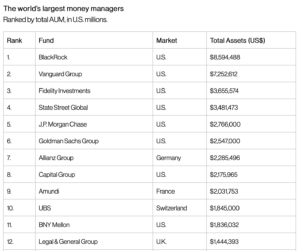Total assets under management (AUM) at the world’s 500 largest asset managers amounted to $113.7 trillion at the end of 2022, according to new research from WTW’s Thinking Ahead Institute.
This represents a 13.7% drop on the previous year, which is the first significant fall in assets since the Global Financial Crisis of 2008.
Japanese managers within the world’s largest 500 fared much better than average with a 5.5% decrease in assets, while North American asset managers saw a 14.2% decrease and Europe (including the UK) experienced an above average 16.8% decrease.
“The research also reveals the continued evolution of active vs. passive assets under management among the largest investment managers,” said the Thinking Ahead Institute.
“Investment in passively managed funds has come to account for 34.7% of the total, as of 2022, up 4 percentage points from the previous year.
“Notably, among the world’s largest managers, this still leaves a considerable majority of 65.3% actively-managed assets.
“Among asset classes, the fall in equity and bond markets caused a gentle shift in weightings with alternative investments increasing to 7.1% of assets managed.
“The market falls caused the combined equity and fixed income allocation to decrease by 2.4 percentage points from a very stable 79-80% share over the last 10 years.
“The falls in equities and bonds also impacted the degree of consolidation within the top 20 managers.
“It is very hard for extremely large managers to have an above average exposure to less liquid asset classes, and so the top 20 were disproportionately hit by the mainstream market falls.
“The top 20 firms’ share of the total assets decreased from 45.2% in 2021 to 44.2% in 2022. Their total AUM decreased year-on-year to USD 50.3 trillion.”

The Thinking Ahead Institute said BlackRock remained the world’s largest asset manager, despite seeing a drop in assets from just over $10 trillion to just over $8 trillion in 2022.
The Vanguard Group is still significantly ahead of Fidelity Investments and State Street Global – ranked third and fourth respectively – which each saw assets dip to below $4 trillion.
Jessica Gao, director at the Thinking Ahead Institute, said: “Throughout 2022, amidst significant turbulence, high inflation and interest rates, and geopolitical tension, investors have faced losses that effectively erased most of the gains achieved during the record-breaking 2021.
“As we have conducted this research, a common theme throughout our conversations with managers has been to expect a higher-for-longer regime in interest rates in which concerns about inflation and growth remain elevated, suggesting investment managers are not out of the woods yet.
“The need to consider sustainability issues and adapt to systemic risk means forward thinking and robust investment processes that are able to model and measure risks like never before.
“Looking ahead, this awareness of system-level risks could offer support to the investment world as it grapples with the generational challenge of climate change impacts and other sustainability issues.”
